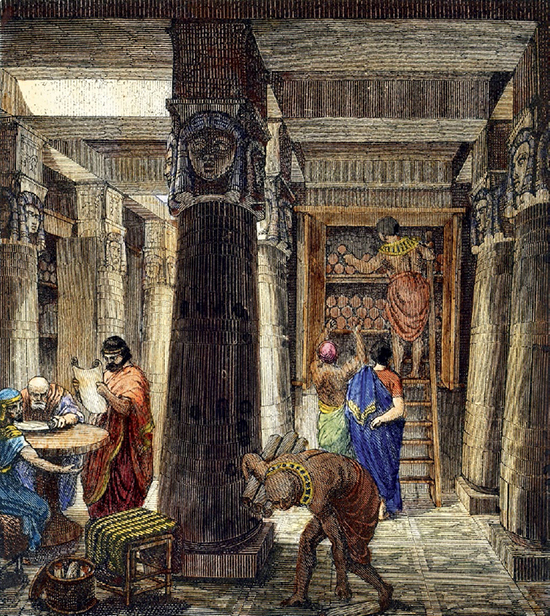c. 300 BCE
Great Library of Alexandria
The invention of writing around 3000 BCE (in Mesopotamia, but independently at other times by other civilizations around the world) meant that, eventually, historical records could finally be kept of people, places, and events. Indeed, the boundary between “prehistoric” and more modern times is usually defined based on when written records began to be kept. A logical next step after recording written records is, of course, figuring out a place to store them for later access. Hence, the concept of the library was born.
Archaeologists have discovered evidence of the first libraries—collections of clay tablets bearing cuneiform characters—in Sumer, dating back to 2600 BCE. Clay proved to be an excellent material for preserving written records, because it was easy to mix from widely available raw ingredients like mud and limestone, and because it can be made hard and resistant to erosion by firing it in a kiln. Similar kinds of records were preserved on papyrus scrolls in ancient Egypt, which was a more difficult material to create but generally a better medium on which to write.
The most famous library of the ancient world was the Great Library of Alexandria, which was created sometime around 300 BCE as an intended repository for all of the world’s scientific, engineering, cultural, and historical knowledge. Books, clay tablets, and scrolls from all over the world were purchased, borrowed, or stolen, and a small army of scribes copied their contents onto papyrus for the library’s permanent collection. The library was a potent display of Egypt’s power in the world, hosting dignitaries and visiting scholars from around the world. While there is much uncertainty, historians estimate that there may have been between 40,000 and 400,000 scrolls stored in the library in its heyday.
Sadly, most of the scrolls were lost when the library was sacked and burned during various sieges as the Roman Empire conquered Egypt between the first century BCE and the third century CE. This irretrievable loss of knowledge from the ancient world represents one of the greatest scholarly tragedies in all history. While some contents of the library were preserved in copies at other major libraries of the ancient world, we’ll never really know what stories, poetry, myths, scientific and engineering insights, and other cultural information was lost when the Great Library of Alexandria was destroyed.
SEE ALSO The Pyramids (c. 2500 BCE), First World Maps (c. 600 BCE), Size of the Earth (c. 250 BCE)
A nineteenth-century engraving depicts an artist’s rendering of a hall in the Great Library of Alexandria in ancient Egypt.
